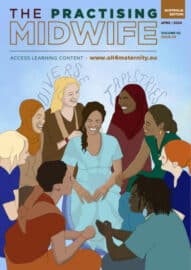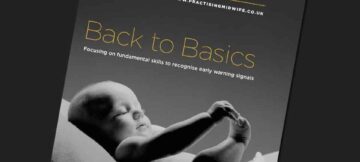Why are pregnant women in prison?- A call for midwives for our research study
Rona Epstein, Honorary Research Fellow, Coventry Law School, Coventry University
Geraldine Brown, Assistant Professor, Centre for Agroecology, Water and Resilience, Coventry University
Elizabeth Bailey, Midwife Research Fellow, Coventry University
Maria Garcia de Frutos, Midwifery Lecturer, City University of London
Summary
Women in prison are known to be a particularly vulnerable group. Although women are less than five per cent of those in prison, they account for over 19 per cent of self-harm incidents. Women in prison are highly likely to be victims as well as offenders. Over half the women in prison report having suffered domestic violence, with 53 per cent of women reporting having experienced emotional, physical or sexual abuse as a child. Pregnant women need extra care, and this leads us to ask why our courts continue to send pregnant women to prison. Moreover, this blog is a call to midwives to contribute to our study.
Background
 About 600 pregnant women enter prison in England and Scotland each year; at any one time, there are about 50 pregnant women in the 12 women’s prisons in England and Wales. In October 2016 of The Practising Midwife published Dr Laura Abbott’s article ‘Becoming a mother in prison’; where she outlined the background of women in prison, detailing some of the vulnerabilities among this group, and reported on her research which involved interviewing pregnant women and new mothers in prison and post-release. This article follows on from Laura Abbott’s and reports on developments since 2016 and our new research project which asks: why are pregnant women in prison?
About 600 pregnant women enter prison in England and Scotland each year; at any one time, there are about 50 pregnant women in the 12 women’s prisons in England and Wales. In October 2016 of The Practising Midwife published Dr Laura Abbott’s article ‘Becoming a mother in prison’; where she outlined the background of women in prison, detailing some of the vulnerabilities among this group, and reported on her research which involved interviewing pregnant women and new mothers in prison and post-release. This article follows on from Laura Abbott’s and reports on developments since 2016 and our new research project which asks: why are pregnant women in prison?
Being pregnant in prison
Research highlights a range of negative outcomes resulting from the incarceration of pregnant women. In 2018, Laura Abbott published her study on the experiences of pregnant women in British prisons. She found that women experienced frustration and stress, which impacted upon their emotional wellbeing. Pregnant women reported being unable to access basic comfort and adequate nutrition and fresh air. The fear of potential separation from their baby was underlying stress – 50% of women separated soon after birth. However, the ‘not knowing’ was especially difficult as women struggled to choose whether to bond or let go of their unborn. Where physical pain existed, little comfort was offered as women are left ‘begging’ for a softer mattress or ‘crying’ for pain relief to ease the normal discomforts of pregnancy.
In 2020, Miranda Davies, Senior Fellow, Nuffield Trust, investigated the use prisoners make of health services, identifying that in 2017-2018 83 women in prison were admitted to hospital either during pregnancy or to give birth. For women admitted to hospital from prisons, a significant proportion had co-occurring mental health concerns, including 34 with concerns related to opioid use and 23 experiencing depressive episodes. 56 women in prisons gave birth, 50 of these births took place in a hospital, but six women (representing one in ten women) delivered before they reached the hospital, meaning that the birth took place either in a prison cell or en route to a hospital. This raises serious concerns about access to care for pregnant women in prison.
In 2017, Lucy Baldwin and Rona Epstein published their study on mothers in prison for short periods. Of the 17 participants, three reported being pregnant in prison. One wrote she had no problems during her pregnancy, ‘the staff were very good to me’. For the other two, the outcomes were very different. Polly’s three children were aged four, seven and nine, and she was pregnant at the time of sentencing. She reported:
I was pregnant and had had two episodes of spotting – which they knew and they still put me on my own. I wanted to see a midwife and I was told I couldn’t, I’d have to see the nurse. I was upset and wanted to ask loads of questions but I never got to ask them because I lost the baby anyway.
I think it was the shock of going to prison that made me lose my baby. I was bleeding on my own in my cell for hours. I was terrified and the prison said they would get me to the doctors in the morning. I was in so much pain they called an ambulance eventually. I lost my baby on the way to the hospital, in handcuffs. I will never forgive them for that. There was no need for cuffs. I wasn’t exactly running away, was I?
Polly was sent to prison for 14 weeks for theft from an electric meter.
Another participant in this survey, Michelle, reported:
I lost the baby in prison and I will always believe that was down to the stress of being locked up – I’m certain I would have carried that baby if I’d been out – I still struggle with the guilt of it – I feel like I’ve killed my baby. I’ve had to have counselling to deal with it.
Michelle was sentenced to 9 weeks imprisonment for benefit fraud. Hence, research points to detrimental impact resulting from sending pregnant women to prison on the health and wellbeing of both mother and unborn child.
Women in the criminal justice system
 The incarceration of pregnant women raises some fundamental questions, particularly when it is known that very few women commit violent offences or are a danger to the public. Almost half of first receptions in the female prison estate are for unconvicted women; 15% of the women in prison are on remand. Many women remanded into custody do not go on to receive a custodial sentence. In 2018, 63% of women remanded into prison by the magistrates’ courts and 38 % remanded by the crown courts did not go on to receive an immediate custodial sentence. They were, however, in jail long enough to further disrupt lives often already marred by chaos and distress. In the year ending September 2019, 44% all prison receptions were remand receptions.
The incarceration of pregnant women raises some fundamental questions, particularly when it is known that very few women commit violent offences or are a danger to the public. Almost half of first receptions in the female prison estate are for unconvicted women; 15% of the women in prison are on remand. Many women remanded into custody do not go on to receive a custodial sentence. In 2018, 63% of women remanded into prison by the magistrates’ courts and 38 % remanded by the crown courts did not go on to receive an immediate custodial sentence. They were, however, in jail long enough to further disrupt lives often already marred by chaos and distress. In the year ending September 2019, 44% all prison receptions were remand receptions.
The Transforming Rehabilitation Act 2014 provided that all offenders who had served prison sentences of more that one day must attend probation supervision for one year. They can be recalled to prison if probation staff find they have failed to comply satisfactorily. Women on licence recall now make up eight per cent of women in custody. The dominant factor for recall is failure to keep in touch with the supervising officer, rather than direct risk of re-offending. In a recent study by the Prison Reform Trusthttp://www.prisonreformtrust.org.uk/uploads/documents/Lacking%20Conviction.pdf, of 24 women who had been recalled, three were pregnant at the time of recall and one stated that failure to attend one appointment had been due to a hospital visit for a pregnancy scan. This woman reported that she was recalled and separated from her daughter the day after she gave birth.
Regarding sentencing, we find that pregnant women may be treated very harshly by our courts, as seen in the two examples above of prison sentences imposed on pregnant women for fiddling an electric meter and for benefit fraud, two non-violent ‘poverty’ offences where many would think a suspended sentence or a community order more appropriate. A further example is the case of Assia B., who used a false document to obtain work. She was 36 weeks pregnant, suffering serious health difficulties, including asthma and a pulmonary embolism, when sentenced to four weeks in prison by a Crown Court. Her solicitor launched an appeal – she was released two weeks before giving birth. The Court of Appeal held that a suspended sentence was right in this case – https://filia.org.uk/news/2020/6/30/why-are-pregnant-women-in-prison
Our research
 On sentence, on recall from licence conditions or on remand – prison is no place for a pregnant woman and her unborn child. Our research, funded by the Oakdale Trust, sets out to explore the reasons that lie behind the fact that about 600 pregnant women enter our prisons each year. Why are pregnant women remanded in custody rather than given bail? Why don’t courts suspend prison sentences or use community orders for non-violent offences? Why are so many recalled to custody after being out in the community on licence? We hope to find answers to these questions through the information given to us by women who have been pregnant in prison.
On sentence, on recall from licence conditions or on remand – prison is no place for a pregnant woman and her unborn child. Our research, funded by the Oakdale Trust, sets out to explore the reasons that lie behind the fact that about 600 pregnant women enter our prisons each year. Why are pregnant women remanded in custody rather than given bail? Why don’t courts suspend prison sentences or use community orders for non-violent offences? Why are so many recalled to custody after being out in the community on licence? We hope to find answers to these questions through the information given to us by women who have been pregnant in prison.
Collaborating with the Lived Experience Team of Birth Companions we compiled an online questionnaire asking women who have been pregnant in prison about their experiences in custody and the court decisions that led to their imprisonment. We guarantee confidentiality – all reports will be published using pseudonyms. We offer a £20 shopping token as a thank-you to any woman completing our online questionnaire.
Why now?
In September 2019 a woman held in HMP Bronzefield on remand gave birth alone in her cell. When prison staff visited the woman’s cell in the morning the baby was found to have died. Following this tragic incident, several investigations were set up, among them: Internal investigation at HMP Bronzefield; Internal Sodexo review; Joint investigation between the Prison Service and HMP Bronzefield; NHS Clinical Review; Police Major Crimes Investigation; Police Safeguarding investigation. The Prisons and Probation Ombudsman (PPO) is to carry out an overarching independent review into the circumstances of the baby’s death. None of these inquiries will ask the question: why was this woman on remand in prison? Nor enquire why the other pregnant women are incarcerated. There is now a new investigation following the stillbirth of a baby at HMP Styal in June 2020. There have been reports that the woman had complained for days of pain and was not referred to a doctor or offered any medical care.
We ask midwives
Recruiting respondents to our online survey will prove a very arduous task indeed. Women’s Centres, which we would have visited, and where we could have explained our research and asked for any potential respondents to contact us, are all closed, due to Covid-19.
We ask midwives with experience of caring for pregnant women in prison or on release to contact us to share their experiences and views. Our email addresses are at the end of this blog, please contact us by email. We would also ask midwives with experience of caring for pregnant women in prison or on release to share this survey with the women, to help support this research, at https://coventry.onlinesurveys.ac.uk/survey-why-are-pregnant-women-in-prison-copy-copy-co-2
Conclusion
The link between poverty, deprivation and social exclusion and involvement in the criminal justice system is clear. Also clear are the wider costs ensued by punishing the vulnerable and the excluded rather than working towards equality and social justice. We support a different approach – one that seeks first to understand and then to repair the fissures in our society, rather than to punish those at its margins. Our research should be seen in this context.
Our survey is accessible at:
https://coventry.onlinesurveys.ac.uk/survey-why-are-pregnant-women-in-prison-copy-copy-co-2
 Rona Epstein
Rona Epstein
 Geraldine Brown
Geraldine Brown
Twitter @gesbrown
 Elizabeth Bailey
Elizabeth Bailey
 Maria Garcia de Frutos
Maria Garcia de Frutos
Maria.Garcia-De-Frutos@city.ac.uk











